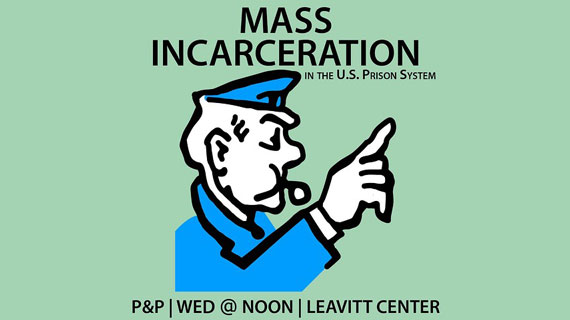Pizza & Politics- Mass Incarceration
Posted: December 18, 2017 | Author: Miles Anderson | Read Time: 3 minutes
 The Michael O. Leavitt Center for Politics and Public Service hosts Pizza & Politics every Wednesday at noon to discuss a current political topic. Leavitt Center student employees research the topic and moderate the conversation. These discussions expose students to a variety of important issues and encourages them to share their own perspectives while learning all sides of an issue. Free pizza is provided for all who attend.
The Michael O. Leavitt Center for Politics and Public Service hosts Pizza & Politics every Wednesday at noon to discuss a current political topic. Leavitt Center student employees research the topic and moderate the conversation. These discussions expose students to a variety of important issues and encourages them to share their own perspectives while learning all sides of an issue. Free pizza is provided for all who attend.
The United States currently has 754 out of every 100,000 people behind bars, over 7 times the rate of incarceration prior to the 1970’s. Many different factors contribute to the high number of individuals incarcerated in the United States. Student moderators Autumn Boren, a sophomore English education major, and Miles Anderson, a senior political science and psychology major, break down some of the controversies surrounding the criminal justice system for this weeks Pizza & Politics discussion.
These are a few of the questions that were posed to the audience:
African Americans are incarcerated at more than 5 times the rate of caucasians. Is racial disparity in incarceration rates situational or systemic?
While answers varied on this topic, most audience members indicated that the higher incarceration rate is systemic and not situational. Some believed that the odds are stacked against African Americans and other racial minorities because of the systemic racism that still pervades american culture. Others thought that it may be due to the higher number of racial minorities in lower-income neighborhoods that are more prone to crime. The comment was also made that it may be both. The systemic issues that have been historically caused by racism and unequal treatment of minorities leading to a decreased likelihood of pursuing higher education or living in a high income neighborhood have created a “situation” that increases the likelihood of committing crimes.
Do minimum sentencing laws undermine judicial discretion?
Minimum sentences are statutes that require a judge to sentence offenders to a specified minimum prison term for a specific crime and judicial discretion refers to the ability of a judge to have some say in the sentence depending on situational factors.
This question received mixed responses. Some strongly supported minimum sentencing laws in instances of violent crimes like rape and murder, but do not think minimum sentences should exist for drug offenses. Others thought that there shouldn’t be minimum sentences at all because it leaves no room for judicial discretion and lumps a variety of situations into the same category. The majority of the comments, whichever direction they leaned, had an underlying theme of “it depends”.
The conversation then shifted to the high number of incarcerated individuals with a mental illness. According to the National Institute of Mental Health, 79% of prisoners have either a drug addiction, a mental illness, or both.
What are the advantages/disadvantages of alternatives to incarceration for criminals with mental illnesses?
The most frequently cited disadvantage to alternatives to incarceration was public safety. Several audience members indicated that it could be dangerous to allow violent criminals to be given a rehabilitative route regardless of their mental illness because they may continue to be violent throughout the process.
Others thought the criminal justice system should begin taking a much more rehabilitative approach due to the lowering rates of repeat offenders in other countries that have incorporated such methods, stating that public safety may be better served by rehabilitative measures anyway.
With few exceptions, audience members agreed that those with a mental illness should receive rehabilitative care even if it is done concurrently with their time spent in incarceration.
This article was published more than 3 years ago and might contain outdated information or broken links. As a result, its accuracy cannot be guaranteed.
Tags: Student Blog Leavitt Center




